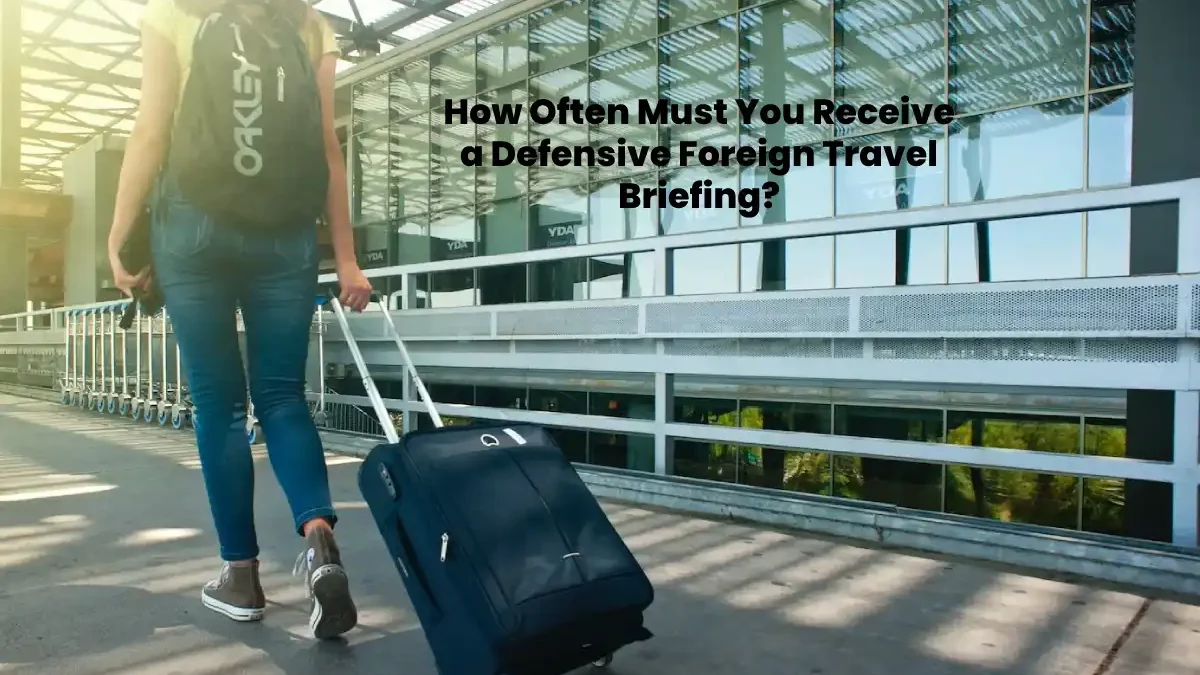When planning foreign travel, receiving a defensive travel briefing can help keep you vigilant and aware while abroad. Defensive briefings provide essential information to safeguard your security when visiting other countries. But how often do you need to get briefed before traveling overseas? Let’s examine the recommended frequency for defensive travel briefings.
Table of Contents
Annual Briefings
Most government agencies and corporations require employees to receive defensive foreign travel briefings at least once yearly. Even if you don’t plan upcoming international trips, sitting through an annual briefing ensures your knowledge is up-to-date and complete. Refresher briefings reinforce key protocols and procedures to follow when traveling abroad. They also highlight any new potential threats to be mindful of.
Before Each Trip
While an annual briefing may be sufficient for some, it’s recommended to also receive a defensive briefing before embarking on each overseas trip. Threat conditions and safety considerations can change rapidly. A briefing right before you depart provides the most current details on risks specific to your destination. This allows you to prepare appropriately and alter your travel plans if needed. Any new country-specific hazards will be emphasized.
Also Read: Trade Exchange
Upon Return from Trips
It would help if you also planned to attend a returnee debriefing after returning from overseas travel. Debriefings enable you to report back on any security issues encountered. They also inform the agency of any emerging risks you notice firsthand abroad. Returnee briefings allow travelers to ask follow-up questions and address concerns after completing international trips.
For High-Threat Areas
If you travel to high-threat destinations, defensive briefings should occur more frequently. In addition to yearly and per-trip briefings, insist on getting continuously updated if the threat environment shifts. For highly hazardous areas, ask intelligence analysts for daily briefings while traveling until safely exiting the country. This provides real-time situational awareness and security recommendations.
When Protocols Change
Significant defensive travel protocols, policies, or requirements changes necessitate immediate re-briefings. Significant new threats, altered country conditions, and revised organizational procedures mean your knowledge could be outdated. Schedule a briefing whenever your agency releases new directives impacting international travel to stay up-to-speed on mandatory precautions.
Briefing Sources
Briefings should come from qualified intelligence or security professionals at your organization. They will synthesize threats from government sources like the State Department, CIA, and FBI. Private travel security firms can also provide quality briefings for companies. Verify the expertise of whoever conducts briefings.
Threat Examples
Specific threats often include terrorism, extremism, violent crime, civil unrest, kidnapping, cybersecurity risks, health hazards, natural disasters, and transportation pitfalls. Request destination-specific details on militant groups, crime patterns, disease outbreaks, climates, travel infrastructure, and at-risk categories like females or Americans.
Briefing Formats
Briefings can range from in-person sit-down meetings to online videos and conference calls. Some utilize presentations, maps, charts, Q&A sessions, pamphlets, or guidebooks. Ensure you get opportunities to ask questions and receive answers from qualified personnel. Update contact info for Embassy officials and other emergency resources.
Travel Alerts
In addition to briefings, regularly check State Department travel advisories, warnings, and alerts before and during travel. These highlight ongoing threats like terror attacks, epidemics, protests, and kidnappings. Alerts help inform your trip plans and identify dates or regions to avoid potentially.
Trip Planning
Briefings will aid you in creating trip plans that minimize risks. You can receive guidance on safer accommodations, low-profile transportation, traveling with protective personnel, identifying protest hotspots to avoid, and following necessary security protocols.
Security Training
In addition to briefings, see if your organization offers or requires complementary security training before foreign travel. Training may cover emergency preparedness, first aid, self-defense techniques, non-confrontational hostage strategies, verifying document authenticity, alternate communication methods if cell service is unavailable, and utilizing security tools like GPS locators. Hands-on training builds critical skills.
Cultural Briefings
Request briefings on local customs, cultural norms, and taboos in the countries visiting. Following strict dress codes, rules for photographing, behavior between genders, or sensitive hand gestures, for example, can help you avoid unintentionally offending locals during travel, which compromises your security abroad. Respecting cultures improves safety.
Mental Health Support
Traveling in high-risk regions can take a toll mentally. Seek advice during briefings on maintaining healthy mindsets while abroad through self-care routines, packing comforting reminders of home, having emotional support contacts, sticking to sleep schedules, avoiding information overload, and leveraging counseling resources offered by your organization if needed.
Insurance Review
Verify what travel insurance plans your company supplies, if any. Briefers can help review policies to ensure optimal coverage for emergencies like medical evacuation, cancellations from unrest, lost baggage, and emergency hotel stays. Some exclude “high-risk” areas, so review the fine print carefully before traveling and know the resources available.
Conclusion
While an annual defensive travel briefing suffices for some, most experts recommend supplementing with additional pre-trip, post-trip, frequent, and policy update briefings. Being informed with the latest security guidance ensures you can travel as safely as possible, especially in higher-risk regions abroad. Plan on getting briefed regularly and ask questions to protect yourself when traveling overseas.
Also Read:



